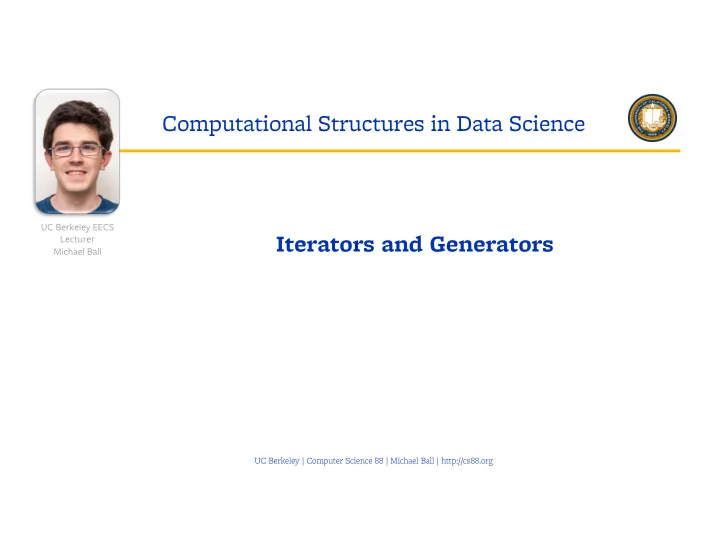

Computational Structures in Data Science UC Berkeley EECS Lecturer Iterators and Generators Michael Ball UC Berkeley | Computer Science 88 | Michael Ball | http://cs88.org
Announcements • Lecture self-check questions are a day late… Sorry! • Ants checkpoint is due Friday • SQL Next week UC Berkeley | Computer Science 88 | Michael Ball | http://cs88.org
Computing In the News • 'Extremely Aggressive' Internet Censorship Spreads in the World's Democracies • University of Michigan News November 17, 2020 • "University of Michigan (U-M) researchers used an automated censorship tracking system to demonstrate that online censorship is proliferating in even the freest countries. The U-M team's Censored Planet tool collected more than 21 billion measurements over 20 months from 221 nations, and found Internet censorship growing in 10 countries, including unexpected places like Norway, Japan, Italy, India, Israel, and Poland. U-M's Ram Sundara Raman said in many cases, legislation compelling Internet service providers to block clearly objectionable material, like child pornography, sets the groundwork for more aggressive policies—and this means censorship measurement is essential. The U-M team said these findings highlight the effectiveness of Censored Planet's approach, which converts public Internet servers into automated sentries that track and report when access to websites is being inhibited." UC Berkeley | Computer Science 88 | Michael Ball | http://cs88.org
Today: • Sequences vs Iterables • Using iterators without generating all the data • Generator concept – Generating an iterator from iteration with yield • Magic methods – next – iter • Iterators – the iter protocol • Getitem protocol • Is an object iterable? UC Berkeley | Computer Science 88 | Michael Ball | http://cs88.org
Iterable - an object you can iterate over • iterable : An object capable of yielding its members one at a time. • iterator : An object representing a stream of data. • We have worked with many iterables as if they were sequences – Sequences are ordered sets you can iterate over Some additional info UC Berkeley | Computer Science 88 | Michael Ball | http://cs88.org
Functions that return iterables • map • range • zip • These objects are not sequences. • If we want to see all of the elements at once, we need to explicitly call list() or tuple() on them UC Berkeley | Computer Science 88 | Michael Ball | http://cs88.org
Generators: turning iteration into an iterable • Generator functions use iteration (for loops, while loops) and the yield keyword • Generator functions have no return statement, but they don’t return None • They implicitly return a generator object • Generator objects are just iterators def squares(n): for i in range(n): yield (i*i) UC Berkeley | Computer Science 88 | Michael Ball | http://cs88.org
Nest iteration def all_pairs(x): for item1 in x: for item2 in x: yield(item1, item2) UC Berkeley | Computer Science 88 | Michael Ball | http://cs88.org
Iterables Demo UC Berkeley | Computer Science 88 | Michael Ball | http://cs88.org 04/15/19 UCB CS88 Sp18 L11 14
Next element in generator iterable • Iterables work because they have some "magic methods" on them. We saw magic methods when we learned about classes, • e.g., __init__, __repr__ and __str__. • The first one we see for iterables is __next__ • iter( ) – transforms a sequence into an iterator UC Berkeley | Computer Science 88 | Michael Ball | http://cs88.org
Iterators – iter protocol • In order to be iterable , a class must implement the iter protocol • The iterator objects themselves are required to support the following two methods, which together form the iterator protocol: – __iter__() : Return the iterator object itself. This is required to allow both containers and iterators to be used with the for and in statements. – This method returns an iterator object, Iterator can be self – __next__() : Return the next item from the container. If there are no further items, raise the StopIteration exception. • Classes get to define how they are iterated over by defining these methods UC Berkeley | Computer Science 88 | Michael Ball | http://cs88.org
Getitem protocol • Another way an object can behave like a sequence is indexing : Using square brackets “[ ]” to access specific items in an object. • Defined by special method: __getitem__(self, i) – Method returns the item at a given index UC Berkeley | Computer Science 88 | Michael Ball | http://cs88.org
Determining if an object is iterable • from collections.abc import Iterable • isinstance([1,2,3], Iterable) • This is more general than checking for any list of particular type, e.g., list, tuple, string... UC Berkeley | Computer Science 88 | Michael Ball | http://cs88.org
Recommend
More recommend